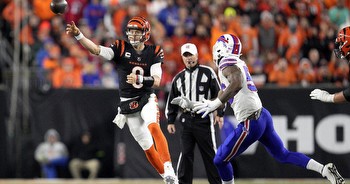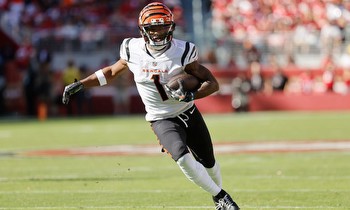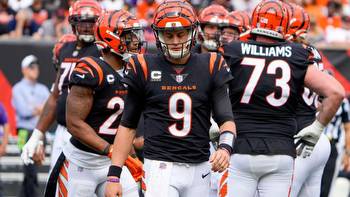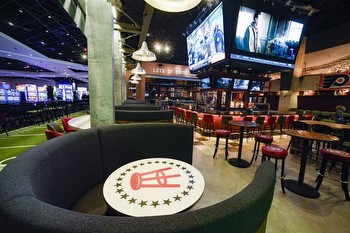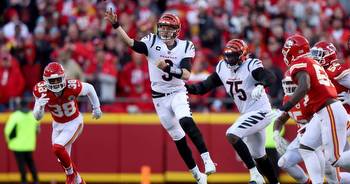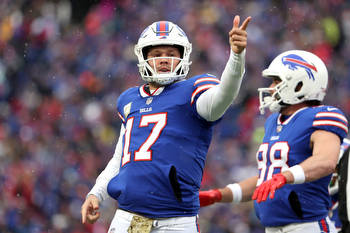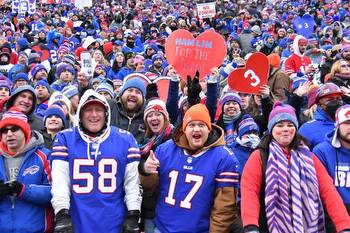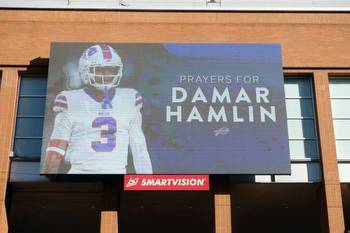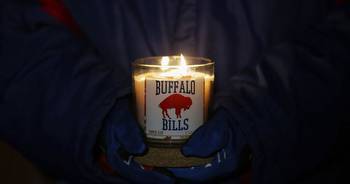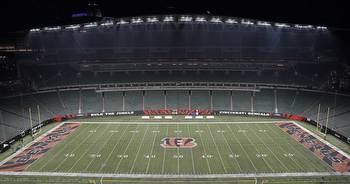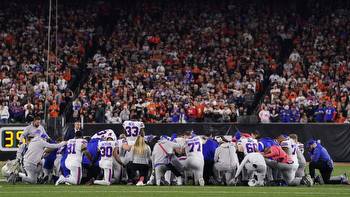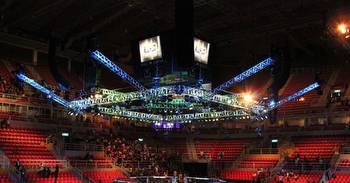Ontarian Hopes To Set Precedent With Damar Hamlin Bet Lawsuit

As with many hardened NFL bettors, Matthew Buchalter grappled with the possibility that the league could cancel the Week 17 regular-season game between the Buffalo Bills and Cincinnati Bengals when Damar Hamlin laid motionless on the ground after an unimaginable emergency that gripped the sports world just after New Year’s.
At the time, the outcome of a series of futures wagers he placed before the start of the regular season wasn’t at the top of his mind. In the tense minutes following Tee Higgins’ hit on the Bills safety, it was unclear if Hamlin would even survive. Buchalter, an actuary with an Ontario insurer, felt a considerable amount of sympathy for Hamlin.
In the days following Hamlin’s collapse, as doctors signaled that the Bills’ safety would make it out of University of Cincinnati Medical Center alive, Buchalter assumed the game would not resume. Three days later, his assumption became correct when the NFL officially canceled the game, declaring the Monday Night Football matchup “no contest.” The decision left both teams with 16 games on the regular season, one less than every other NFL team.
Language in Caesars Sportsbook‘s house rules serves as the basis of a lawsuit Buchalter has filed against the casino company in Ontario Small Claims Court. At issue are nine future bets Buchalter placed, totaling $2,300. The complaint represents one of the first legal actions by an Ontario bettor against a commercial operator since the province launched its private iGaming and online sports betting market last April.
“Caesars’ treatment of these wagers was inconsistent with each other and with applicable terms and conditions (the “House Rules”),” the lawsuit reads. “As a consequence, Caesars has breached its contract with Matthew and been unjustly enriched. … Matthew has suffered the reciprocal and consequential loss. There is no juristic reason for Caesars’ unjust enrichment.”
House rules
Of the nine wagers Buchalter placed, eight involved the Bills and Bengals, two teams which ended the regular season atop their respective divisions. In Week 18, the Bengals (12-4) defeated the Ravens to clinch the AFC North, while the Bills beat the Patriots to finish the regular season 13-3. Only one of Buchalter’s bets, a $50 future on the Bengals to win exactly 13 regular-season games, remained in question.
When Hamlin collapsed on Jan. 2, the Bengals led 7-3 with roughly nine minutes elapsed in the first quarter. Had the Bengals prevailed in Week 17, Buchalter’s ticket could have cashed to the tune of $2,000. Instead, the league’s decision to cancel the game left the Bengals with exactly 12 regular-season wins.
Buchalter’s NFL futures wagers at Caesars Sportsbook
- Colts, NFL Best Regular Season Record, $500, Odds: +2500
- Bills, Regular-Season Wins, Under 10.5, $1,000, Odds: +230
- Bills, Regular-Season Wins, Under 10.5, $500, Odds: +230
- Bills, Exact Regular-Season Wins, 15 wins, $50, Odds: +4000
- Bills, Exact Regular-Season Wins, 16 wins, $50, Odds: +7500
- Bengals, Exact Regular-Season Wins, 13 wins, $50, Odds: +4000
- Bengals, Exact Regular-Season Wins, 14 wins, $50, Odds: +6000
- Bengals, Exact Regular-Season Wins, 15 wins, $50, Odds: +15000
- Bengals, Exact Regular-Season Wins, 16 wins, $50, Odds: +50000
Buchalter focused on language in Caesars’ Terms and Conditions when constructing an argument on why he believes that Caesars breached its own house rules in the bet settlement process. Caesars, according to the lawsuit, graded the eight bets as a loss and voided the ninth (the 13-win bet), Buchalter noted. With the voided bet, Buchalter received a full $50 refund.
Shortly after contacting Caesars’ customer service team, Buchalter was informed on Jan. 12 that the sportsbook decided to settle all bets where the outcome was “a mathematical certainty” and to void all bets where the outcome was not “a mathematical certainty.” Buchalter cites language in “Rule three” of Caesars’ general rules on football wagering. The rule, he argues, was intended to apply to single-game wagers, not season win total bets that take longer to settle. Moreover, he claims the rule directly contradicts language on the ticket that states a team must play all 17 regular-season games for “action,” or for the bet to be valid.
Bets for all markets stand provided at least 55 minutes of play have taken place and an official result is declared unless a result has already been established. If a game is postponed, the game must be played within 7 days of the original scheduled date or bets are void. The exception being the final/championship of a competition, in which case all bets stand for the rescheduled game.
A basic principle of law, according to Buchalter, is whenever there is a contradiction between two rules, the rule that is more specific should outweigh the one that is more general. The more specific one, in his view, is the rule that stipulates a team must play all 17 regular-season games.
“You can’t take a rule meant to apply to a specific bet and override it with a rule that is more general,” he told Sports Handle.
On the same day Buchalter communicated with members of Caesars’ customer service team (Jan. 12), he initiated a formal dispute with iGaming Ontario, the lottery subsidiary of the Alcohol and Gaming Commission of Ontario. By Feb. 3, iGaming Ontario rejected Buchalter’s complaint, citing Caesars’ general rules section, clause three. A spokesperson from iGaming Ontario declined comment when asked on the lawsuit.
Buchalter insists that the lawsuit has implications beyond his dispute. Furthermore, if Caesars’ attorneys offered Buchalter a deal to “make him whole” on the condition that he accepts a non-disclosure agreement, he asserts that he would reject the offer.
“A fair resolution would be to refund all of the bets that should have been voided, not just for me, but for everyone who is in the same situation,” Buchalter told Sports Handle. “I would not accept any settlement offer that requires a non-disclosure agreement, because that would be a disservice to the betting community.”
Timing of the suit
In many respects, Buchalter’s expertise in sports betting makes him the right person to file a potentially groundbreaking suit. A graduate of the University of Waterloo, Buchalter has a degree in actuarial science and statistics from a school that is viewed by some as the “MIT of Canada.”
Buchalter, whose Twitter account (@PlusEVAnalytics) has approximately 18,500 followers, teaches a sports betting course in the Toronto area through a program called analytics.bet. On his website, Buchalter claims that one North American horse racing syndicate which placed more than $100 million in bets using his models recorded a seven-figure profit over a period of several years.
Buchalter served the claim in small claims court in mid-February, just as the NFL wrapped up its season. Caesars has 20 days from the time it received the claim to file a response. The timing places the deadline at March 5. A Caesars spokesman did not respond to a request from Sports Handle for comment.
An argument could be made that certain bets should have been graded as a loss due to the mathematical impossibilities surrounding the circumstances. One Buchalter wager would have cashed only if the Colts recorded the best record in the AFC. With a 4-12-1 record, Indianapolis finished with one of the worst records in the league. The parameters of the bet, Buchalter counters, required every NFL team to play 17 regular-season games for the wager to receive action.
Ultimately, by potentially breaching its contract with Buchalter, Caesars refused to honor the terms of those wagers, resulting in an undue gain, he argues. Buchalter requests judgment for the wagers he contends were settled improperly, as well as an additional payment for the costs of preparing the claim.
“I think it’s very important to set a precedent. Operators have shown a willingness to deploy tactics that some bettors find unfair, but are permitted by their T&C to increase their profits at bettors’ expense,” Buchalter told Sports Handle. “That’s their right, but then they need to be held to those same T&C in situations like this.”
